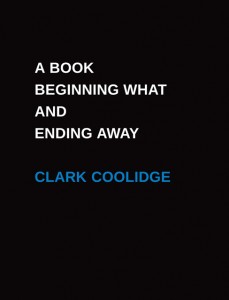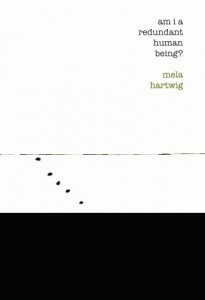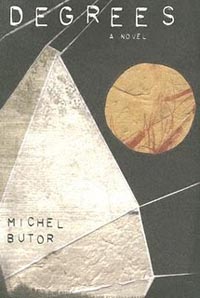Joe Milazzo’s SUMMER READS
Summer reading picks from Joe Milazzo:
***
 A Book Beginning What and Ending Away by Clark Coolidge (Fence Books, 2013)
A Book Beginning What and Ending Away by Clark Coolidge (Fence Books, 2013)
Partly out of excitement to have this work restored to print; Coolidge is neither understood nor celebrated enough as a prosodist, or, if you prefer, prose thinker, à la Stein (I know this mostly from his writings on jazz / improvised music); the book itself just long and packed / impacted enough to occupy a season.
Randomly selected excerpt: “Door only to be taken in. Mingles into the corner as it comes. Enough, and green, and by and large, were familiar.”
 My Dead by Amy Lawless (Octopus, 2013)
My Dead by Amy Lawless (Octopus, 2013)
Have you seen the table of contents? The volume opens with 8 individual poems, all entitled “One Way to Write a Sonnet Is To Number the Lines.” This appeals to me, and aligns with my own formal / lyrical interests.
Randomly selected excerpt: “Night is ugly as all the other shit / I just mentioned”
 Am I A Redundant Human Being? by Mela Hartwig (Dalkey Archive, 2010)
Am I A Redundant Human Being? by Mela Hartwig (Dalkey Archive, 2010)
I picked this up at the open of the year courtesy Dalkey’s annual sale, but have not yet been able to see if the book itself satisfies the expectations (high-ish… is this Madame Bovary without the self-delusion, an early negation of the novel [an imitation of Arthur Schnitzler tangenting itself into anticipations of Tao Lin], or a Modernist self-help manual?) I have for it based on the title.
Randomly selected excerpt: “Of course, his obvious attraction flattered me. But, then again, maybe it didn’t.”
June 5th, 2013 / 11:00 am
By Kelman Out Of Pessoa
 By Kelman Out Of Pessoa
By Kelman Out Of Pessoa
by Doug Nufer
Les Figues Press, 2011
194 pages / $15 Buy from Les Figues or SPD
Why write a conceptual novel? Is conceptual writing meant to be read? Is conceptual writing truly “conceptual” in the way conceptual art was? If conceptual art was more to be read than it was to be seen, then, following the same “logic,” is conceptual writing more of a spectacle than it is a reflection? Isn’t writing by and large dematerialized anyway? Doesn’t reading atomize as much as it coheres? Isn’t the novel ultimately only intelligible in terms of a material transcendence? Is Douglas Nufer’s By Kelman Out Of Pessoa more Sol Lewitt or more Rene Girard?
I think the latter rather than the former. I think the conflation of Oulipian constraint and conceptual aesthetics has become too easy. I think schematicism need not make a virtue of the perfunctory. I think that novels like Nufer’s, or Harry Mathews’ Cigarettes, can simultaneously be novels and “anti-novels”: mere pretexts or engines for putting one word, then one sentence, then one paragraph, then one chapter, after another, but also “subjective experiences” that offer readers traditional pleasures and vertigos. I think that the author’s and the reader’s processes have to collaborate in order to complete the novel, and this book; they are symbiotic, even if one antedates / predates (upon?) the other. I think all novels—and, by extension, all characters, all points-of-view, all settings, all symbols, all themes—are thus accidents of time, eruptions of advantage and disadvantage. I think about Michel’s capture in Bresson’s Pickpocket, how it is a direct result of his notion of who he is in relationship to someone else who, in a context explicitly over-determined by competitiveness, is not quite whole or anything beyond a phantom. I think that readers always have a hand out for the last word.
Louis Bury, in his introduction, writes: “Doug Nufer wrote By Kelman Out Of Pessoa by going to the track once a week for an entire horseracing season, placing bets on behalf of three fictional characters’, the results of which, in turn, dictated the structure and plot of the novel.” Louis Bury, in his introduction, writes: “The difference between the type of order play produces and the type of order art produces is that the former tends towards reductive simplicity, the latter towards complexity, even entropy.” Louis Bury, in his introduction, writes: “Each of the novel’s principal literary influences can be seen as the embodiment of a novelistic desire. Kelman: the desire to write about horse betting and have it be something other than genre fiction. Pessoa: the desire to make an elaborate show of masking and unmasking aspects of oneself.” Louis Bury, in his introduction, writes: “Blaise Pascal’s famous wager—that it’s a good bet to believe in God because if you win you gain everything and if you lose you lose nothing—was a bet, ultimately, not about God’s existence but about the nature of life itself: that we humans possess more purpose and meaning to our movements than mere game board tokens.”
What are we really saying when we say that a work of art, like a novel, “moves us”? What are we really saying when we say that we want to improve ourselves? What are we really saying when we say we’ve been a victim of bad luck? What are we really saying when we say that we’ve sabotaged ourselves? What are we really saying when we say that the story means what it does when it comes to its end? What are we really saying when we say, “Don’t worry; I’ve got a plan.” What are we really saying when we say we want to be more or less like so-and-so? What are we really saying when we say that there is a real world? What are we really saying when we say to writers: “Small is beautiful”? “Kill your darlings”? “Find your voice”? “Write what you know”? “Don’t lose your reader”?
January 7th, 2013 / 12:00 pm
A Collaborative Review of Good Offices
 Good Offices
Good Offices
by Evelio Rosero
Trans. by Anne McLean & Anna Milsom
New Directions, 2011
144 pages / $13.95 Buy from New Directions or Amazon
In September of 2011, my colleague Laura Vena and I decided that we were both sufficiently interested in Evelio Rosero’s Good Offices to attempt a “collaborative review” of the novel. (As something of a student of the novel-as-form, I was intrigued by Good Offices‘ superficial resemblance to Lewis’ atypical Gothic The Monk. Laura, though she will probably raise a protest, is an expert in Latin American literature.) Laura and I ultimately agreed that our collaboration would take the form of a conversation about the book, which we each read yet refrained from discussing prior to our officially meeting. Presented here is as full, complete and accurate a record of our conversation as Google’s transcription of our live chat will allow. What it lacks in context and gracefulness I trust it makes up for in spiritedness and candor. In fact, reading over these exchanges again, I appreciate how they allow me to eavesdrop on those selves taking turns speaking up—can I really say that they speak through me?—when I talk about books. Or: when I am retelling yet again those fictions by virtue of which we can even discuss the notion of fiction. (JM)
A word about tone: due to the candid nature of IM conversations, much of the following text is raw in character. My initial impulse was to edit out all my informal language, which reflects not my intellectual self, but the manner in which I engage in impassioned conversation with friends… Not necessarily for mass consumption. But in discussions with Joe, we ultimately felt we should maintain the tone of the original conversation to keep true to the experiment of long-distance collaboration that resulted in this review. For better or worse. (LV)
March 26th, 2012 / 1:00 pm
Degrees by Michel Butor (Part 2)
 Degrees
Degrees
by Michel Butor
Trans. Richard Howard
Originally published: Simon and Schuster, 1961
Reprint currently available from Dalkey Archive Press, 2005
351 pages / $13.95 Buy from Dalkey Archive
[Read Part 1 of this review here]
“I should like to be able to restore to your memory this moment, this hour which is already so far in the past for me that, despite the attention I was paying to you, to your whole class, I am capable of recovering with certainty which gestures you might have made, at which moments you were listening, at which you were distracted.
To help you realize what you yourself have been, in other words, where you come from, in other words where you are going—what is the vector of your present—I must already make a great imaginative effort of reconstruction, I must put myself in your place, try to see myself through your eyes and consequently let you speak, thereby destroying the equilibrium of this narrative.” (104) READ MORE >
August 22nd, 2011 / 12:00 pm
Degrees by Michel Butor (Part 1)
 Degrees
Degrees
by Michel Butor
Trans. Richard Howard
Originally published: Simon and Schuster, 1961
Reprint currently available from Dalkey Archive Press, 2005
351 pages / $13.95 Buy from Dalkey Archive
It is painful to report as much, especially here at the outset of this review, one of whose ostensible purposes is to attract readers to a classic of first-generation French postmodernism, a nouveau roman that was for many years unavailable in English and, even when it was, was not widely discussed. Yet it necessary to reveal that this is a novel [1] concerned with writers and writing. Its main character / protagonist / hero / narrator is a writer, and every dramatic action in the book both originates and terminates in “the literary.” The aesthetic, social and moral quandaries all authors face are accorded some reflection in its pages, and, with the turn of each page, the novel grows in self-consciousness, as if such awareness-of-being-aware could accumulate in measurable deposits, like the nacre in a pearl. And make no mistake: objects matter in the world created by this novel. For this novel proposes to be a manuscript, and a rescued one at that; this manuscript’s (re-)assembly in the form (one both ideal and literal) of a book is not just a plot point which the reader is asked to mark, a scope through which the reader is to track and focus the novel’s action. The making of this particular book (that is, the manuscript “within” the novel) is something only we, as disinterested yet absorbed readers, can achieve. We aren’t just reading pages, reading in the sense of digesting them. A page of this book, once read, is much like a page once it has been written upon. It grows in thickness under the influence of our attention, just as it must have swelled with ink and sweat and the pressure of the author’s hand as it was being composed. Each page thus acquires a distinct texture and profile, and can be stacked, will lay flat, but each page lends its own disarray to the sequence of pages being so collected. Each page will lay less “true” than it did when it was only blank, and the array of pages each reader puts aside (or places behind him/herself) rests disjointed and askew.
August 19th, 2011 / 12:00 pm
